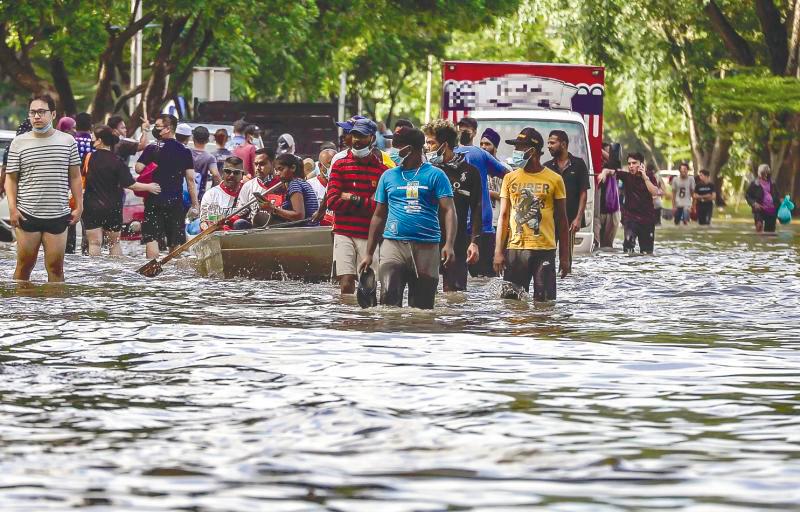THE waters have not receded. The ruins and remains are visibly piling up as rubbish. Many victims, especially those in remote villages, are disheartened that hardly any government officer is accessible to help them apply for the meagre funds promised.
Many were misdirected to various departments in Putrajaya because their district officers and penghulus have washed their hands off, blaming the physical boundaries beyond their jurisdiction.
All they want is just one government officer they could reach out to within their zip code.
A frustrated victim from Kampung Jawa summed it up: “If it was an election campaign, there would have been loads of representatives reaching out to every single voter at every nook and corner. Candidates will personally wheel the old and disabled people to the polling system. Why can’t they reach us now?”
The flood victims are still reeling from one of the “worst floods in 100 years”.
They had watched their entire life-savings float out of their doors and settle as spongy, rotten and unusable rubbish beyond description. They have lost everything.
So far there has been no practical or specific narrative from the government on how the victims are going to be resettled.
To date thousands are still staying in temporary relief centres, and are even adapting to the lifestyle.
Some have made their own makeshift tents and have been complacently staying there for weeks.
The people had so much hope with the daily announcements on millions of ringgit to be disbursed to victims.
Since Dec 17, about 70,000 people have been displaced while at least 48 drowned after the unusually high rainfall that caused severe flooding in eight states.
Prime Minister Datuk Seri Ismail Sabri Yaakob had promised RM1.4 billion in cash aid and other forms of relief measures to at least 30,000 affected households.
These include house and vehicle repairs, death benefits, relief on utility bills and damaged infrastructure.
Under the National Disaster Management Agency’s (Nadma) Bantuan Wang Ihsan, RM1,000 will be given to every head of household.
The prime minister also said he would ensure the Social Welfare Department would facilitate and channel additional resources to the victims.
Although Nadma is slowly reaching out to clusters of victims in halls and relief centres for the handouts, it was the volunteers who were cleaning the drains, clearing the rubbish and helping to resettle the victims in the last few weeks. The victims were unable to reach any social welfare officers for aid.
Initially, while the deadly waters were still rising and victims were screaming to be rescued, the federal and Selangor governments were disagreeing about conflicting responsibilities.
Ignoring these disputes, it was highly commendable that the Armed Forces sprang into action to help evacuate flood victims to relief centres, instead of waiting for any directive from Nadma.
To date, the army officers were seen ferrying children to school as well as distributing groceries to the families.
Services in Johor and Pahang were reported to be more sympathetic and systematic, and had handled the crisis better.
What is troubling is that the scourge of floodwaters is not new to the country.
Considering the regularity at which floods occur, one would imagine that the government would have the past experience and wisdom to implement a better system of management.
Every year, we hear disturbing stories of flood disasters. Why is there no integrated flood risk management system for emergency response?
This time around, the hallmark of inefficiency was symbolically mirrored by two non-working pumps in the Taman Sri Muda floods.
We were surprised that engineers in the Department of Irrigation and Drainage did not know there was a malfunction.
This malfunction had unlocked a whole range of fears and anxieties in the public.
We have no idea what else is flawed and has been left unattended.
Right now, every level of government and components within each level are under scrutiny.
Undoubtedly, the victims should be the most vital concern at the moment.
Public servants must rise up to this catastrophe and address this flood victims’ re-settlement as soon as possible. People are heartened by acts of initiative and heroism from their neighbours and volunteers.
An inspiring story is about an Indonesian who climbed a row of rooftops where victims were stranded, and circulated just one stove and basic utensils so that people could cook.
It was just one stove but it was a quick innovative response to people who were starving.
That small innovative gesture made a great world of difference to a few people. It was just one person and one stove.
The 1.6 million staffed civil service has all the resources, the training and the expertise to redeem the people from their present suffering.
Surely, they could facilitate better flood risk governance strategies?
Comments: letters@thesundaily.com













